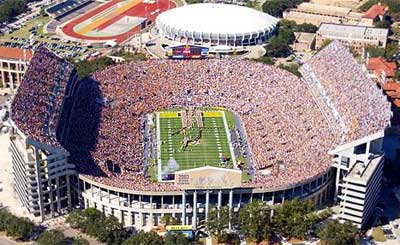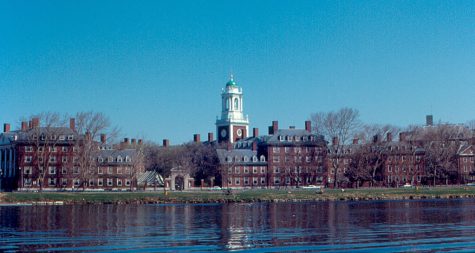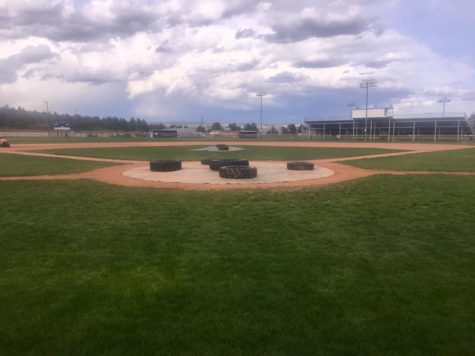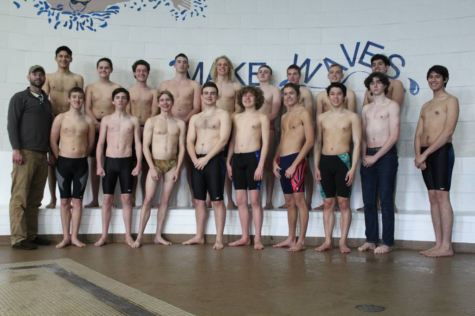College Corruption

http://mallmarketingmedia.com/images/my/Tiger-Stadium.jpg
Every year the National Collegiate Athletic Association brings in close to one billion dollars (ESPN.com) and not a penny of that goes to the financial aid of the athletes. The NCAA holds firm on their belief that college sports should remain to be an amateur athletic program and therefore the players should not be paid. And who can blame them? In no other work field can you earn upwards of a billion dollars without paying your workers a cent because of a rule established 50 years ago when the profits of collegiate sports did not exceed a thousand dollars. However, this is not the only controversy recently arisen regarding the NCAA, they also face accusations of corruption, have unjust rules to protect their profits and because of this, certain athletes have formed a player’s union.
The NCAA uses the term amateur as an argument for why they do not supply their players with any financial aid other than a free tuition at their respected colleges and universities. However, many argue that collegiate sports have grown to a level that can no longer be defined as amateur. Amateur is defined as a person unskilled in or having only a superficial knowledge of a subject or activity. With that being said, is it still amateur when you have 100,000 die hard fans watching you compete every Saturday against 55 other young men who spend 4 hours a day practicing. Is it still amateur when the University of Alabama earned 123 million dollars off of their unpaid athletes? Is it still amateur when these players spend countless hours a week preparing to play their best game possible, hoping that they do not get injured or passed by another player on their team, causing them to lose their scholarship? According to the NCAA, it absolutely is still amateur. Players bringing in millions of dollars for their universities and the NCAA often cannot afford to feed themselves. The MVP of last March’s NCAA tournament Shabazz Napier claimed, “I don’t feel student-athletes should get hundreds of thousands of dollars, but like I said, there are hungry nights that I go to bed and I’m starving,” and since then, the NCAA has taken measures to supply adequate food for their student athletes. All Division 1 athletes are now provided with unlimited meals and snacks further depicting how progress is imminent and so long as the student athletes demand to be heard, the NCAA will take steps to satisfy their demands.
Not only are players not paid, but if a player does receive payment for any reason pertaining to their athletic ability, he is immediately suspended. Enforcement for these regulations are inconsistent, and the Big 12 commissioner called out the NCAA saying “Enforcement is broken. The infractions committee hasn’t had a hearing in almost a year, and I think it’s not an understatement to say cheating pays presently. If you seek to conspire to certainly bend the rules, you can do it successfully and probably not get caught in most occasions,” and it is widely known that cheating and breaking these regulations often pay off. With almost every school and athlete in the nation bending or breaking the rules in some way shape or form, is it really fair when one player out of hundreds is caught and suspended, often times ruining any chances at a professional athletic career? Rules are inconsistent as well; for instance a player is subject to more punishment for taking money than he would be if he committed most crimes. Jameis Winston, the reigning Heisman winner and starting Quarterback for Florida State, was arrested last Spring for stealing crab legs from a local supermarket. Once football season came around, Winston faced no suspension and got off with little to no legal repercussions. Now had Winston been caught having a Florida State fan buy those crabs for him, he would have lost his eligibility as an NCAA athlete and most likely would have been suspended for an entire year depending on what happened during the repeal process.
Certain inconsistencies and injustices regarding college athletics have driven a group of football players at Northwestern University to unionize, as they believe that they are employees of the university and therefore not only have the right to be paid, but the right to have a voice and be represented by a players union. Courts have determined that the players are within their rights to unionize and that there is nothing legally restricting the players from forming their desired unions. Many fear that unions will lead to a strike or circumstance that will lead to student-athletes demanding pay. College football fans throughout the nation tend to be against paying athletes, with their argument almost always being that a free 60,000 dollar a year education is plenty of pay for athletes who are supposed to be students first. However, more and more people are seeing the need to further compensate these athletes in some way shape or form for the millions and millions of dollars that they bring to their universities.
Rarely do we see a college football or basketball season where the NCAA is successful in staying out of headlines for some form of corruption or controversy. This billion dollar industry has a flawless recipe for success, do not pay their employees and come up with clever terms and loopholes to justify the unpaid labor of athletes. Regardless of how bad the NCAA wants this topic to be forgotten, the idea of paying student athletes continues to grow in support and precedence among sports followers.

Although my birth name is Ryan Henley, I am most commonly known as Bear Claw and Rhino. The origins of those aliases are known to few, and those who have...












Cody Maynard • Nov 15, 2014 at 1:18 pm
Awesome change of pace Ryan. Very analytical which is different from what I’ve seen but you’re actually really really good at it. I encourage you do more articles like this in the future.